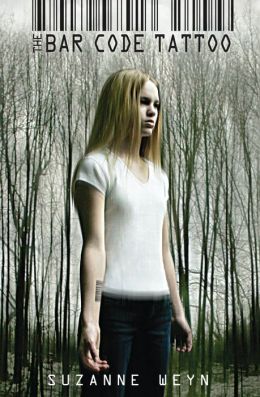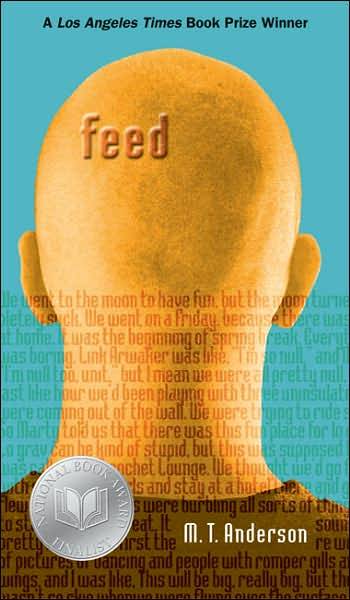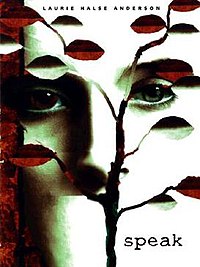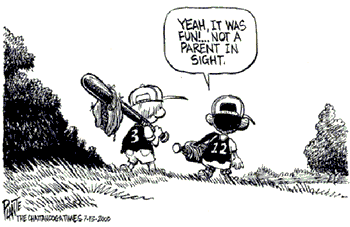
Tomorrow's review book, Unwind by Neal Shusterman, deals very centrally with surgery. This is a topic that comes up often in teen fiction, and today I'm going to explore why.
Surgery is a scary thing, but it's also something most of us actually experience. This makes it a relatable fear in fiction for any age. (Allow me to divert your attention for a brief moment to the short story "Autopsy Room Four" by Stephen King, found in Everything's Eventual. The only surgery I've ever had, I was terrified when they put me asleep because I thought I would wind up like that character: totally lucid and about to be operated on.)
| SCARY. |
 |
| This is your brain on adolescence |
So you aren't a kid, and you don't want to be treated like one anymore. But the adults around you - particularly the ones directly in charge of you - know that you also aren't an adult. So you're stuck in this weird limbo where you can make some decisions for yourself, but not all of them.
You can see why someone in this situation would relate very easily to a fictional situation where adults want to perform surgery on teens - especially unwilling ones. Doctors are adults (Doogie Howser notwithstanding). Adults unfairly exercising power over teens is a widely relatable theme. And surgery is an easy way to demonstrate one group's power (the doctors) over another group (the teens).
 |
| Remember: SCARY. |
 |
| Ugh, normal pockets? How gauche. It's all about impractically star-shaped pockets now, didn't you know? |
Look no further than Uglies and its sequels by Scott Westerfeld for evidence of this. Uglies are kids who are desperate to turn sixteen and get their surgery to turn them into Pretties. Pretties all look basically the same: flawlessly gorgeous. It's how their society eliminates jealousy and other negative feelings that cause greater problems like war. Later in the series, there are a wide range of elective cosmetic surgeries, allowing anyone to get fancy moving tattoos, additions to their eyes (including jeweled clocks that run backwards, as Shay demonstrates for us) and nearly any other body modification you can imagine.
One example that combines these two facets of teen fiction surgery is The Bar Code Tattoo by Suzanne Weyn. (This is on my "to read" list, so my information is coming from summaries and reviews. Feel free to correct me if I'm wrong.) Everyone is getting bar code tattoos to make life easier (purchases, identification, etc.) and Kayla is suspicious. She doesn't want to get one, and this makes her an outcast. This combines the power trip the government has over its citizens by "requiring" the tattoo, and the fact that, due to a lack of some physical attribute, Kayla is a pariah, even to her family and friends.

Besides the inferiority complex that comes with being a teen in a world of adults, another very common theme for YA fiction is change. Because that's what being an adolescent is all about. You change from a kid into an adult during this time. You usually change schools (middle to high school, high school to college or into the workforce). Most people change friends... a lot. You build new interests and hobbies and talents and knowledge. That's not to say that children or adults don't do these things too, but it's a defining characteristic of adolescence.
Surgery is a catalyst for change, especially in a literary sense. The person who was put under before surgery is not the same person who wakes up groggy and talking nonsense while they work off the anesthesia.
 |
| Also? A little bit scary. |
Remember our review book from two weeks ago, Starters by Lissa Price? Callie was desperate for money, so she went to a company that would install a microchip in her head and allow her to go to sleep while they put an Ender's (elderly person's) mind into her body. When she wakes up the first time, she finds it eerie to have no idea where her body went or what it did while she was out.
Referring back to Uglies, Uglies believe (correctly) that the Pretty-making surgery will change them entirely, for life. (I won't spoil the book by going into details, but it's a little... sinister.) One day - the day before your sixteenth birthday - you're a little kid, an Ugly, nothing. The next, you've had extensive surgery to make every bit of you absolutely perfect, and you're somebody: a Pretty, with influence and wealth and ability.
Another example can be found in Feed by M. T. Anderson. The feed is like having the internet in your brain: it is a way to communicate with others who have the feed, learn lessons for school, shop, and look things up like you would online now. This example combines all three of our points: it is a way for higher governmental powers to control you (although this point isn't very strong, it is evident), anyone who doesn't have the feed is an outcast, and getting the feed causes big changes (good or bad).
Referring back to Uglies, Uglies believe (correctly) that the Pretty-making surgery will change them entirely, for life. (I won't spoil the book by going into details, but it's a little... sinister.) One day - the day before your sixteenth birthday - you're a little kid, an Ugly, nothing. The next, you've had extensive surgery to make every bit of you absolutely perfect, and you're somebody: a Pretty, with influence and wealth and ability.
 |

Related to surgery and also prevalent in young adult fiction is the topic of self-injury, specifically cutting. Cutting - in a literary sense - is like a small surgery a character performs on himself or herself in order to bring about a change in how they feel (usually to get relief or release).
Cutting is relatable for a large percentage of the teen demographic, because it is a widespread problem with varying degrees of severity. It can also be viewed as an aesthetic issue, because of its visibility (in comparison to the inner turmoil it represents). It also serves as the opposite side to the power struggle issue you get when talk about surgery: cutting gives the teen character power over their body, where surgery would give someone else power over it. (Note: I'm not condoning cutting or any form of self-injury; I'm just making a point about literature.)








As undergraduates, Cassy and I had a wonderful professor who taught adolescent and children's literature. At the time, she was working on an article about cutting in adolescent literature (which you can read here), and she got me really interested in the topic (and first demonstrated the ties between cutting and surgery in literature to me, which is why this topic is being mentioned here). My personal recommendations are:
Cut by Patricia McCormick
How I Live Now by Meg Rosoff
Impulse by Ellen Hopkins
Girl, Interrupted by Susanna Kaysen
The Burn Journals by Brent Runyon
Speak by Laurie Halse Anderson
(Not all of those deal specifically with cutting; there are some with other forms of self-injury. Also, two of them are autobiographical: Girl, Interrupted and The Burn Journals. The rest are fiction.)
Impulse by Ellen Hopkins
Girl, Interrupted by Susanna Kaysen
The Burn Journals by Brent Runyon
Speak by Laurie Halse Anderson
(Not all of those deal specifically with cutting; there are some with other forms of self-injury. Also, two of them are autobiographical: Girl, Interrupted and The Burn Journals. The rest are fiction.)












